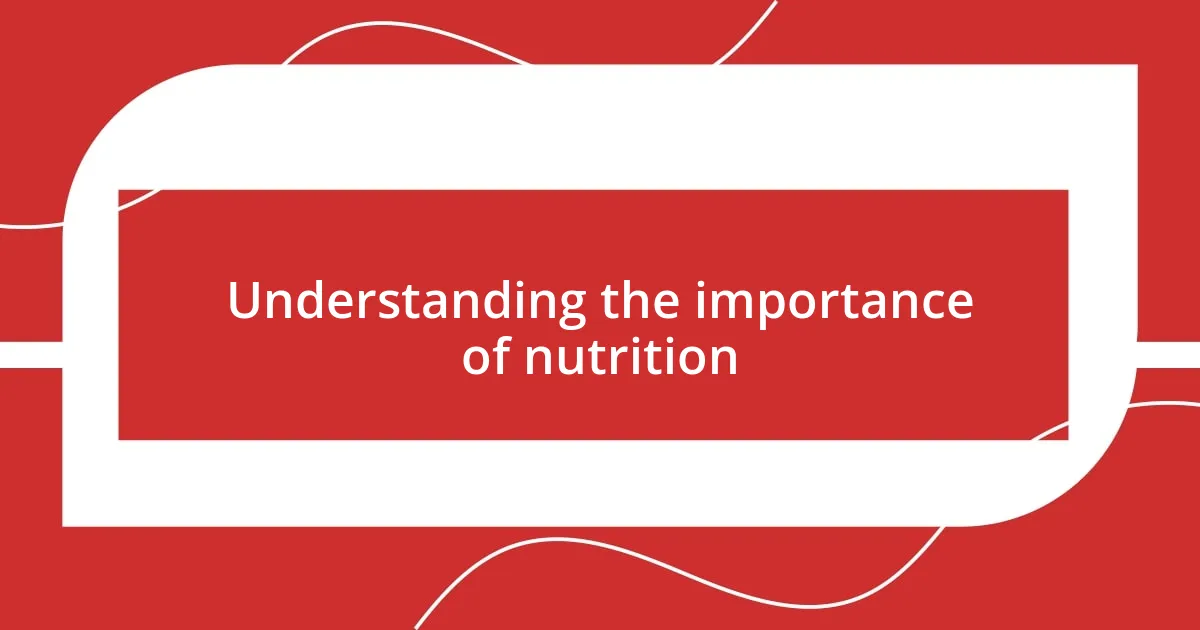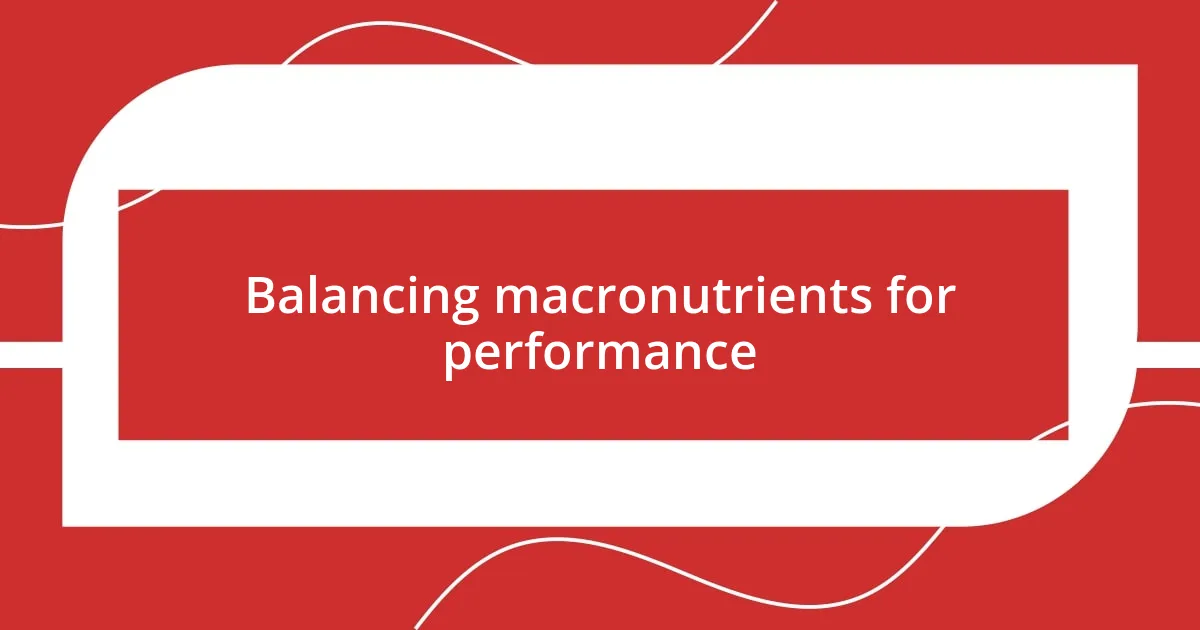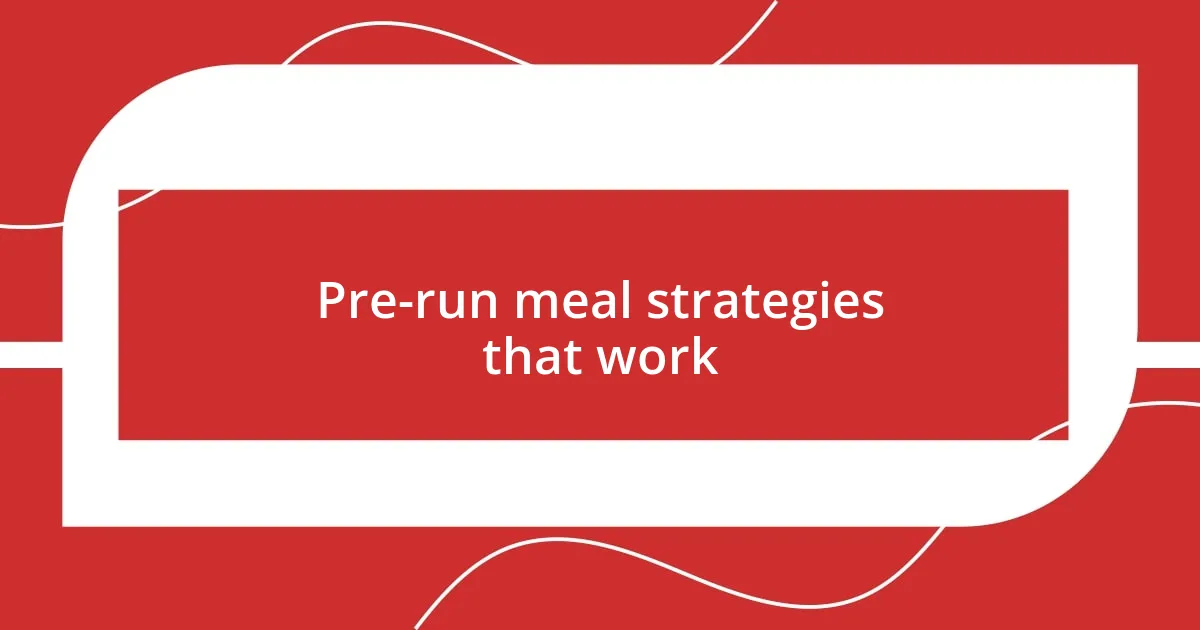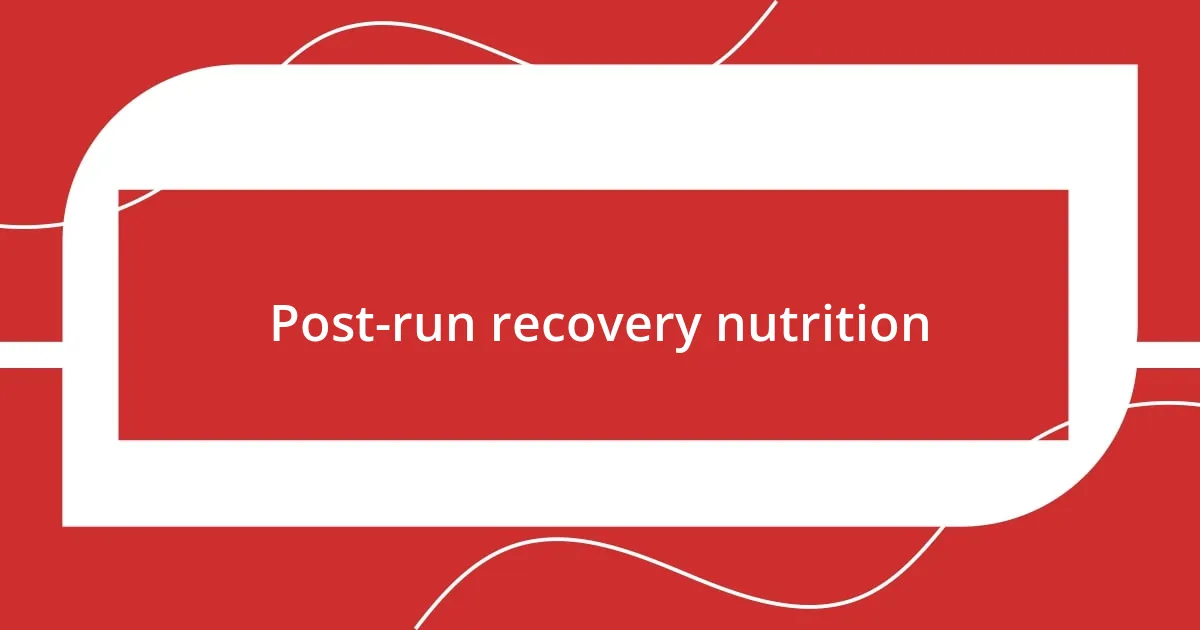Key takeaways:
- Running evolved from a challenging task to a source of joy and mental strength, highlighting its emotional benefits.
- Proper nutrition, including balanced macronutrients and hydration, is crucial for enhancing running performance and recovery.
- Timing meals before and after runs significantly impacts energy levels and muscle recovery, with personal preferences playing a key role.
- Listening to one’s body and incorporating varied training can improve overall performance and prevent injuries.

My journey into running
I remember the first time I laced up my sneakers, feeling a mix of excitement and anxiety. It was a chilly morning, and I didn’t quite know what to expect. As I took my first few steps, I questioned whether I could keep going, but there was just something liberating about moving my body and breathing deeply in the fresh air.
As the weeks passed, running transformed from a challenge to a joy. Each run became an opportunity to clear my mind and reflect on my day. I often found myself pondering how running could teach me resilience; whenever I wanted to stop, I pushed through, and that’s when I learned the power of mental strength.
One particularly memorable run took place during a summer evening. The sun was setting, casting a golden hue over the park, and I felt an overwhelming sense of gratitude. I can still vividly recall the moment I realized that running wasn’t just about physical fitness for me; it was a celebration of life and a way to connect with myself emotionally. Doesn’t it feel incredible when you stumble upon an unexpected realization like that?

Understanding the importance of nutrition
Nutrition plays a pivotal role in enhancing my running performance and overall well-being. When I first started running, I underestimated how much my dietary choices impacted my energy levels and recovery. I remember one particularly grueling week when I neglected my nutrition, opting for quick snacks instead of wholesome meals. By midweek, I felt sluggish, and my runs suffered immensely. It was then that I realized fueling my body properly is as crucial as putting in the miles.
To help highlight the connection between nutrition and running, here are key points I’ve gathered through experience:
- Energy Supply: Carbohydrates serve as primary fuel for my runs, providing the energy needed for endurance activities.
- Muscle Recovery: Protein plays a vital role in repairing muscles after a workout; I now make sure to include a protein source in my post-run meals.
- Hydration: Staying hydrated has taught me that even slight dehydration can hinder my performance, so I always carry water during my runs.
- Nutrient Timing: Eating the right foods before, during, and after runs has genuinely transformed my experience; I’ve noticed my endurance improving when I enjoy a well-timed snack.
- Mental Clarity: I’ve found that a balanced diet contributes to better focus and mood, making my runs more enjoyable and purposeful.
Embracing the significance of nutrition has changed how I approach both my training and my meals. It’s about nourishing my body to support my passion for running, and honestly, it feels rewarding to know that what I eat directly influences my performance and enjoyment on the track.

Balancing macronutrients for performance
Balancing macronutrients is essential for optimizing performance, especially for someone deeply invested in running like me. I’ve discovered that each macronutrient—carbohydrates, proteins, and fats—plays a unique role in my running journey. For instance, whenever I opt for a hearty bowl of oatmeal before a run, I can feel the difference in my energy levels. Carbohydrates fuel my long runs, while protein helps with muscle repair post-workout. It’s almost like a dance between these nutrients, flowing together to create the best version of me on the track.
Over time, I learned that timing my intake is just as crucial as the macronutrient balance. I recall a time when I had a big race coming up, and I was experimenting with my pre-race meal. I chose a mix of carbs and protein, making sure to avoid anything too heavy. As I crossed the finish line, I understood that every meal matters; being in tune with my body’s needs can make or break my performance. It’s fascinating how small adjustments can lead to noticeable improvements.
I’ve even come to appreciate how fats contribute to my running. Initially hesitant about incorporating more into my diet, I began adding avocados and nuts to my meals. Surprisingly, these healthy fats not only kept me satiated but also provided sustained energy for those long-distance training sessions. Have you ever experienced that euphoric moment when everything just clicks in your routine? It’s truly invigorating when you find the right balance and see it reflected in your performance.
| Macronutrient | Role in Performance |
|---|---|
| Carbohydrates | Primary fuel source for endurance, increases energy levels |
| Proteins | Aids in muscle recovery and repair, essential after workouts |
| Fats | Provides sustained energy, important for longer runs |

Pre-run meal strategies that work
A pre-run meal should feel like a warm-up for your body and mind. Personally, I find that a banana and a small scoop of peanut butter hit the spot perfectly. It’s light but packed with energy, allowing me to feel fueled without feeling weighed down. Isn’t it amazing how a simple snack can make such a difference in how I approach my run?
Another strategy that has worked wonders for me is the right timing of meals. I typically aim to eat a well-rounded meal about two to three hours before my run. One time, I enjoyed a bowl of rice, grilled chicken, and veggies a little too close to my workout—let’s just say stomach cramps are not my favorite running buddy! I learned the hard way that giving my body time to digest is crucial if I want to stay comfortable on the trail. Have you ever had a meal that just lingered too long before a workout?
Also, I’ve realized the significance of personal preferences in pre-run meals. Some runners thrive on sweet options, while others might prefer savory. I remember experimenting with yogurt and berries before a long run, feeling so light yet invigorated. This made me question: what works best for my body? It’s a journey of discovery, and listening to my body has been essential in shaping my ideal pre-run meal strategy. Each runner is different, and finding your rhythm can lead to some truly rewarding runs.

Hydration tips for runners
Staying properly hydrated is one of the most important aspects of running that I’ve come to value. I remember one particularly hot day when I set out for a long run without enough water. Halfway through, I felt drained, and that heavy sensation in my legs reminded me of the importance of hydration. It’s a simple yet crucial practice that can make or break your experience on the road or trail. Have you ever experienced that dreadful moment when a lack of hydration hits during a run?
I’ve also learned that hydration isn’t just about gulping down water before a run. It’s a continuous journey throughout the day. I make it a point to carry a water bottle with me, sipping regularly rather than waiting until I’m thirsty. For me, integrating electrolytes into my routine has been a game changer, especially after intense sessions. I remember the first time I tried an electrolyte drink after a tough run; the rush of replenishment was exhilarating! It made me wonder: how often do we underestimate the role of these vital minerals in our recovery?
During long runs, I’ve discovered that making fluid choices is just as important. I carry a small hydration pack with me, which not only holds water but also allows me to carry sports gels or chews. It’s always there when I need a quick boost, like during a grueling trail run I completed last summer—just when the fatigue set in, a bit of quick energy made all the difference. This blend of hydration and nourishment keeps me focused, proving that little preparations can yield big results. What are your go-to strategies for staying hydrated while you run?

Post-run recovery nutrition
After a run, the importance of proper nutrition cannot be overstated. I’ve ventured down the road of experimenting with post-run meals, and I’ve discovered that a blend of carbohydrates and protein is the golden combination for recovery. For instance, I often whip up a smoothie with Greek yogurt, spinach, and a banana; it’s delicious and provides the essential nutrients my body craves after a hard workout. Isn’t it fascinating how what we consume post-run can significantly influence how we feel the next day?
Finding the right timing for recovery meals has been another enlightening aspect of my journey. I’ve noticed that eating within 30 to 60 minutes post-run prevents that heavy, fatigued feeling in my muscles. I remember a day when I delayed my post-run meal; the muscle soreness hit me like a freight train the following morning! That experience taught me the valuable lesson of not only fueling my body but also timing it well. What’s your experience with the timing of your meals after a run?
I also enjoy playing with flavors in my recovery meals. Chocolate milk has become my guilty pleasure after a tough session; the sweetness paired with the protein helps me recharge. Occasionally, I get adventurous and toss together a sweet potato with black beans and a dash of lime for an extra zest. Each recovery meal feels like a reward after the hard work, making the process all the more enjoyable. How do you like to treat yourself after a run?

Lessons learned and future goals
Reflecting on my running journey, I’ve realized that the biggest lesson I’ve learned is the importance of listening to my body. There were times when I pushed through fatigue or discomfort, thinking it was just part of the process. However, I’ve come to understand that respecting my limits and giving myself the necessary rest is just as vital as the training itself. Have you ever ignored your body’s signals only to pay for it later?
Going forward, my goal is to integrate more varied training sessions into my routine. I’ve found that mixing up my runs, whether through interval training or exploring new trails, not only keeps things exciting but also significantly improves my performance. Recently, I tried a track workout for the first time, and the adrenaline rush was both challenging and rewarding. What new training methods have you considered trying to enhance your running experience?
Additionally, I plan to focus on nutrition even further by experimenting with whole foods and plant-based options, as I’ve noticed a positive shift in my energy levels. I’m intrigued by the idea of meal prepping for the week, ensuring that every bite is purposeful and aligned with my running goals. Just imagining a fridge filled with colorful, nutritious meals makes me eager to dive into this new phase! How do you approach planning meals to support your running lifestyle?















